This blog was initially published on Just Energy.
The justenergy research project aims to explore areas where policy, energy poverty and vulnerability intersect, in part, to gain a better understanding of ‘lived vulnerability’. To probe beyond the laws and regulations that define the relationships between energy systems and energy consumers, we have arranged to visit people in their homes.[1]
We chose to visit Réseau Éco-Habitat, close to Compiègne, in the Hauts-de-France region of France, based on its reputation as an innovative non-profit association that helps energy-poor homeowners navigate the complex process of accessing services and service providers to carry out deep energy renovations. Réseau Éco-Habitat first helps people gain access to financial aid schemes offered by the French agency for housing (Agence nationale de l’habitat [ANAH]) and other public agencies, as well as private actors (mostly foundations) that provide other types of support, including personal assistance and financial aid.
In turn, Réseau Éco-Habitat acts as the coordinator of renovation projects, collaborating with a network of local suppliers ranging from builders and insulators to those with expertise on efficient heating systems, windows, lighting and appliances and equipment. As their name suggests, Réseau Éco-Habitat aims – to the greatest extent possible – to use environmentally friendly and bio-sourced materials. Beyond these technical aspects, collaborators are engaged from the financial community, volunteers, donors and local businesses who offer discounted or donated goods and services. Réseau Éco-Habitat identifies five stages of the process:
- Identify homeowners living in deep energy poverty.
- Frame the technical aspects that will optimise choices of materials and work to be done.
- Mobilise financing and financial assistance available to make the project possible, typically by accessing plans from ANAH, the ‘Conseil départemental’, the ‘Communauté de communes’, Secours Catholique – Caritas France et the Fondation Abbé Pierre and other associations.
- Plan the project and discuss it to limit the disruption to the family’s life.
- Accompany the family to learn ‘eco-tips’ that will help reduce energy consumption over the long term.
This outing was carefully planned and assisted by Franck Billeau, founder of Réseau Éco-Habitat, who confirmed their mission as an association “that helps local people living in vulnerable circumstances to get their homes and their lives in a better shape.”
Over visits to two households, we were able to see how Réseau Éco-Habitat operates to engage local actors to help local people and communities. Critical across all steps of the process is a close relationship with Caritas France – Caritas France, a network of volunteers who make long-term commitments to accompany marginalised people. As will be shown below, these individuals are essential to building trust between the homeowner and the many public and private actors they will have to engage with.
Here, we compare and contrast the before and after situations of two households: Benoit, who has inherited the house he grew up in, which is badly in need of repair; and Nadine and Jean-Pierre, who had work carried out in April 2019. In the case of Benoit, everything has been approved but he is waiting for work to commence; we quickly learn that it is causing him a great deal of stress. In sharp contrast, Nadine and Jean-Pierre have survived the process, which can be long and disruptive, are now very proud to welcome us into their home and tell us about themselves.
Together, these visits show us how transforming homes – even those on the verge of being condemned as unliveable – can transform lives.
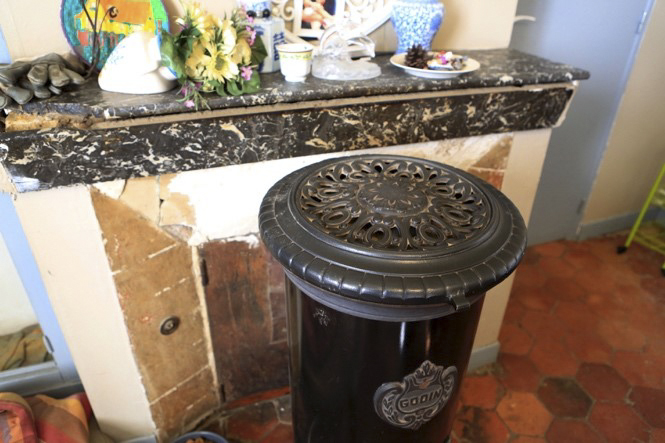

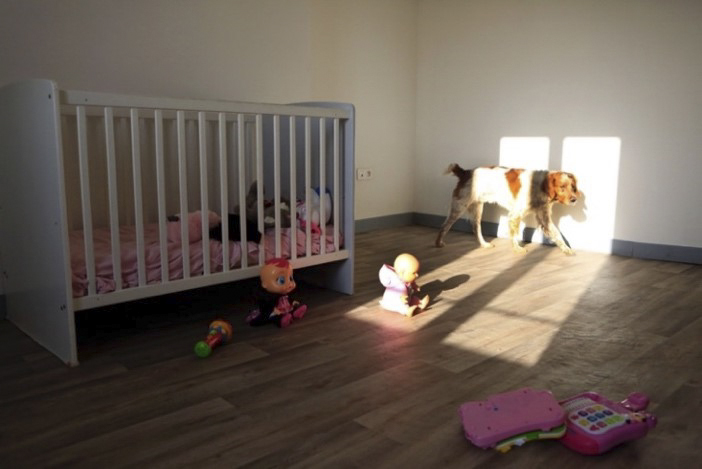
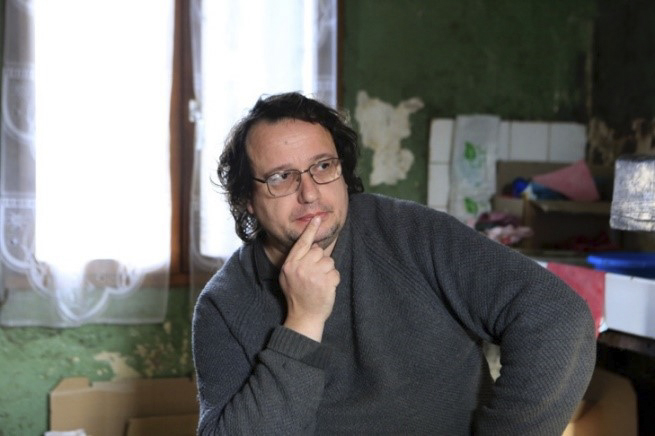
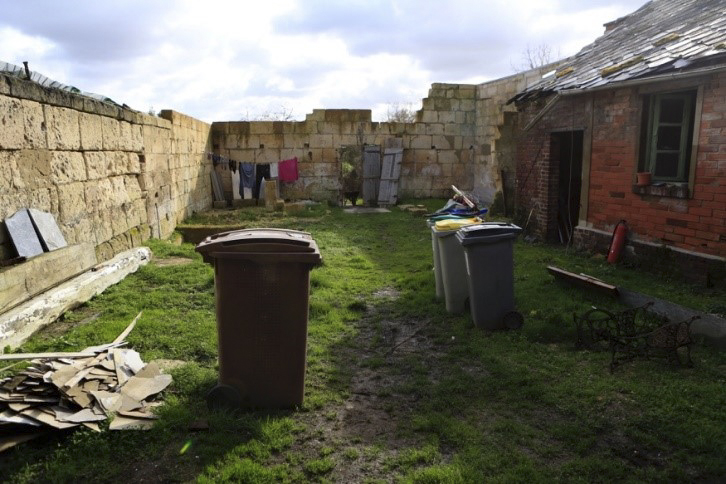
At 48 years of age and following the deaths of his parents, Benoit lives alone in the house that his family bought when he was 10, where he and his brother grew up. Almost four decades on, not much has changed. The electricity wiring is dangerously old and with few outlets, Benoit relies on a network of power bars to connect appliances and equipment like a TV and clock-radio.
While there is a wood-burning stove set into the original fireplace, he has been advised against using it because it produces dangerously high levels of carbon monoxide (CO). In fact, it is likely that only the combination of poor insulation and air leaks around doors and windows have saved Benoit (and earlier the whole family) from CO poisoning. At present, Benoit relies solely on an electric heater. But to keep costs down, he turns it on only at night – and only in the room in which he sleeps. During the day, the indoor temperature hovers around 9°C. (Despite keeping our coats on, after only an hour in the kitchen area, we feel the cold creeping into our bodies.) As the house does not have a hot water system, Benoit uses an electric induction stovetop placque for both cooking and all hot water needs.
As we learn from Hubert, the Caritas France volunteer assisting Benoit, Cambronne is a very small village. The two men knew each other by sight before they officially met. While the house fronts onto a main street, Franck Billeau raises the point that it is like many others in the region: a passable exterior hides the reality of what it is like to live in. Leading up to 2016, the Mayor of the Commune visited several times and advised Benoit of the need to carry out works, an opinion that was seconded by a volunteer of Caritas France. Benoit did not disagree, but saw no way to advance given the disconnect between the scope of work needed and his personal circumstances.
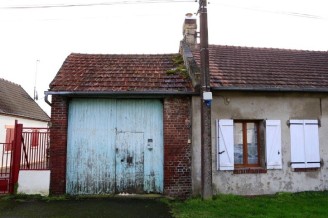
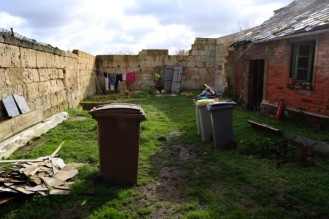
The condition of the two rooms in which Benoit spends daytime hours are not really liveable. Gaps around windows and doors let in cold air; old wiring is exposed; and damp and mould are causing wall plaster and coverings to degrade and fall down.
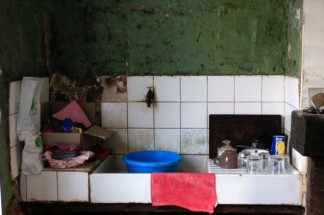
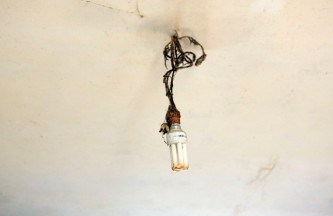
Once Réseau Éco-Habit evaluates a house and deems it likely to be eligible for various social assistance schemes, Caritas France volunteers take on the critical role of guiding people like Benoit through the processes and paperwork that would otherwise be overwhelming – and almost certainly a barrier to their accessing help that is designed for their situations.
While a large portion of the costs (often between €25,000 and €50,000) will be covered, homeowners are typically expected to pay a small portion, which often means getting a loan – perhaps for the first time in their lives. To assist with the loan, the volunteers help people prepare a household budget that can be shown to the bank.
In Benoit’s case, a loan of €1,300 needed to be approved – for him, a distressing figure. While preparing Benoit’s budget, Maxime of Réseau Éco-Habitat and Hubert identified the fact that he bought the local newspaper every day as an expense that would have to be cut. It was a harsh blow for Benoit, who felt the paper was his only ‘treat’ and a connection to the outside world. Subsequently, Hubert became keenly aware that Benoit’s trust had been undermined and would need to be regained.
Now, Benoit stays on top of the news by riding his bicycle to a library that is 3 km away, from which he also borrows DVDs. On Saturday mornings, he cycles to a local food bank. (During our meeting, Hubert mentions another charity providing basic necessities and Benoit makes plans to visit it).
The aim for Benoit’s house is to transform the two main rooms, at a total cost of €42,000. As of 2018, all of the paperwork for assistance has been in place and the funds have been transferred to his account (~€19,000 from ANAH, diverse amounts from other social entities and €9,000 from the ‘Communauté de commune’). In turn, Benoit paid about 50% of what he has received over to entities that have been engaged to carry out the work, and was told the work would begin ‘soon’.
But delay after delay is amplifying Benoit’s anxiety – over both the money paid out so far and the sum still sitting in his account, which he needs to leave untouched for when the work is complete. He worries that ‘what’s gone is gone’, while no work has been started. Clearly reticent by nature, during our visit Benoit speaks little but often repeats the theme, “I hope the work will go ahead quickly.”
Having been reassured in the summer 2019 that the work really would start soon, Benoit packed many of his belongings and, with the help of his brother, undertook work that would reduce the overall costs – including tearing out insulation that does not meet current standards. Six months on, no start date is set.
Building on the relationship Hubert has established, Franck spends a lot of time trying to reassure Benoit. They go over the renovation plans and the financing mechanisms, and Franck vouches for the company that will do the work, saying it is only a matter of time and availability of workers and material.
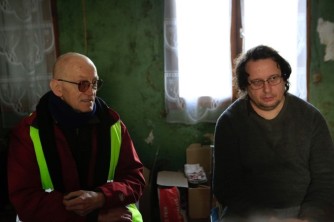
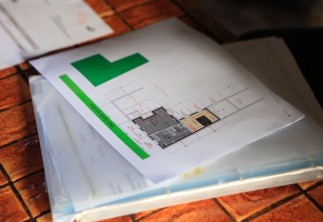
“Fortunately, I feel morally supported,” says Benoit, referring to Hubert, who he feels he can call as he needs to. For example, Hubert was the first person he called when an initial transfer of €15,000 landed in his bank account – a sum that made Benoit [feel] very uncomfortable.
With money designated for renovation work waiting in his bank account, Benoit is living in a home that is increasingly uninhabitable, and his trust in the system is waning. As we learn later while visiting the office of Réseau Éco-Habitat, this is a bottleneck they need to address. People in Benoit’s situation do not need extra anxiety.
Nadine and Jean-Pierre
Nadine and Jean-Pierre, both in their sixties, married in May 2012 – but have been together more than 30 years and have three adult children and four grandchildren. They own the home in which they brought up their family, but with little income, had no means to keep it maintained or carry out any major work.
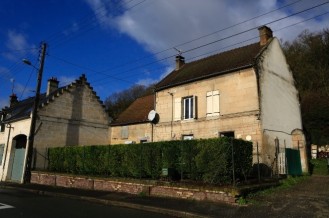
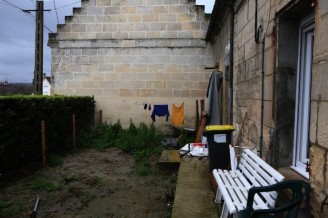
For as long as they’ve been together, Nadine and Jean-Pierre have been accessing various services through Caritas France.
In 2017, Jean-Pierre suffered a stroke, which resulted in some physical disabilities (neither of them is currently employed). Around the same time, Jacqueline became their dedicated Caritas France volunteer (as with Hubert above, she was there during our visit). Upon seeing the condition of their house, she proposed to call Réseau Éco-Habitat.
“We were cold, the radiators didn’t work,” says Nadine. Outside, she adds, “it was slippery. We fell in front of the entrance. We realised something was wrong with the house.”
| For decades, they had also relied primarily on an old fireplace and a GODIN wood stove, which led to indoor fires more than a few times over the years. Nadine recalls a particularly bad one on a Christmas Eve. “We wanted to call the fire department,” she says, “but we didn’t have a phone. The neighbour had to call.” |  |
As a result, the inside walls had become blackened. Then there were other problems: a stone wall that was always cold and wet; a leak in the bathroom that would seep everywhere; a washing machine that flooded regularly, etc. The poor state of the house also made it easy for rats and mice to infest the kitchen.
“We were embarrassed,” admits Nadine. A particularly difficult point was that their sons were growing up, getting married and having children, but the state of the house had deteriorated to the point that social workers were cautioning against allowing the grandchildren to visit.
While establishing their eligibility for assistance was relatively straightforward, Nadine and Jean-Pierre also encountered delays of about 18 months in the work actually being done as no ‘operator’[2] was available. But once the work finally commenced – in spring 2019 – everything was done within about 6-8 weeks. Réseau Éco-Habitat, together with local building companies, volunteers, friends and family, carried out renovations both inside and outside of the house. The couple’s three sons added finishing touches, such as painting the interior with supplies donated or discounted by local companies that are part of Réseau Éco-Habitat.

Post-renovation, a clear source of pride for the couple is how the work helped to rebuild the relationships with their sons and grandchildren. Romane, their one-year-old granddaughter who is just starting to walk and talk, now visits regularly and has an upstairs bedroom where she can have a nap (or sleep over) and leave her toys.
Given Jean-Pierre’s current level of disability, Réseau Éco-Habitat was also able to tap into adaptation funds to do things like install a walk-in Italian shower with various supports and other modifications that will ensure the house remains suitable as the couple ages and perhaps lose other aspects of their independence. This is one way that Réseau Éco-Habitat is thinking ahead about how to ensure people can live with dignity.
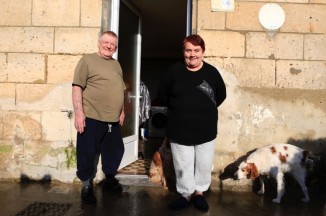
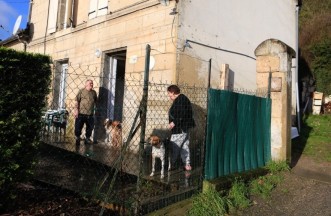
According to Jacqueline, the house renovation led to a total personal transformation. Nadine and Jean-Pierre no longer hide inside, but are now actively engaged in the community.
“We’ve got people who come to the house to visit,” says Nadine. “Now, I even go to the hairdressers – and we often go for a walk with our friend from Réseau Éco-Habitat.” In fact, she says, “We’ve never travelled so much: maybe we’ll go to Paris!”
And about those visitors? Shortly after the work was completed, the housing minister Julien Denormandie and the press came by to see the transformation.
Réseau Éco-Habitat
Finally, we visit the offices of Réseau Éco-Habitat, located in a recently refurbished factory, where we met with four members of staff (Franck, Marie-Claire, Maxime) and two additional Caritas France volunteers, Paule and Marc; as well as Pierre, the president Réseau Éco-Habitat . The discussion highlighted the importance of the volunteers and social connections in the process of truly transforming lives.
The group noted different forms of vulnerability that households face as well as the hidden costs of poverty. In this rural area dotted with small towns, many of these households are physically isolated and, as in the case of Benoit, the actual living situation is often invisible, hidden behind facades in good condition.
“Living in seclusion at home is only a reflection of the situation: you withdraw into yourself, everything becomes complicated,” says Marie-Claire.
This raises the point that all partners consider each renovation project also as a ‘life project’. They recognise that engaging in a retrofitting project forces people who typically have a very ‘day-to-day’ existence to project their lives well into the future. Planning ahead for the next year and a half is a huge challenge: it is often necessary to give the families some time to ‘see’ themselves commencing on this journey and accepting volunteers into their lives. In this regard, each project requires time to mature.
Additionally, telling people who have a hard time making their income last through to the end of each month that work costing €50,000 will be performed on their home can be overwhelming. While the volume of paperwork can be overwhelming too, and the time required frustrating, with guidance from the volunteers, the homeowners gain new life skills. Over time, they show pride, for example, in having completed the application and submitted necessary documentation on time. The change in people’s physical and mental well-being following the renovation work is obvious: they physically straighten up, they smile. Often, they re-enter society after long periods of self-isolation. Some, say the group, even re-enter the workforce.
The role of the Réseau Éco-Habitat team is more on ensuring that homeowners feel supported regarding the technical aspects of the renovation, as there are many things to discuss about what work, materials and equipment are appropriate for each home. Choice of insulation is one example: while adding inside insulation is cheaper than applying outdoor cladding, homeowners need to understand that it will add about 15 cm to each wall, effectively reducing the overall floor area on which the value of their home is calculated. People have to understand the trade-off between the value of a smaller, but much more energy efficient house – and ultimately have to take the final decisions.
Maxime recalls a couple who were experiencing a lot of tension in their home. At the end of the renovation work, they became more relaxed and were able to mend relationships with their children. The parents felt safer about their children’s future and their young son started talking and began to invite friends over after school, which was not the case before the work was done.
Building a long-term, trusting relationship with the people they support is key for the volunteers, who encourage families to believe in the change and help them discover what is best in each circumstance. It is, they admit, usually a long process that requires a deep commitment.
All parties agree on one critical point, however. While the actual renovation work organised by Réseau Éco-Habitat is not overly cumbersome once underway (usually taking 6-8 weeks, during which time people have to relocate), the time it takes to go through the processes is too long. It is also a complicated process, particularly as there are a lot of middlemen and typically takes 12-18 months. In extreme situations, such delays can be a matter of life and death.
“We’ve had cases without accompaniment,” says Maxime, “but after a while, people gave up, maybe because there was too much distance.”
Réseau Éco-Habitat will soon become an ANAH ‘operator’, i.e. an entity entitled to receive and directly manage public funds for renovation, which should make procedures more fluid and timing more predictable.

Concluding remarks
On our way back to Paris on the train we were left very humbled. The work that Réseau Éco-Habitat and the Caritas France volunteers do is remarkable. In many ways, they are ‘translators of rights’, bringing to people the options they have to seek help and support. The association’s staff and the volunteers they partner with are clearly fully committed to helping people define and navigate ‘a life project’ and to make things better for them. It was a truly eye-opening experience to be able to visit people in their homes and to see first-hand what it means to be vulnerable, to live in isolation and not to know who to turn to. The delicate work of mobilising local resources to help local people is remarkable. This work cannot be done without deep bonds of trust, which are built over time and with the patience of admirable people.
[1] Naomi (https://esrcjustenergy.wordpress.com), Marine (https://nextenergyconsumer.eu) and Marilyn (www.en-act.org / www.coldathome.today) visited Réseau Éco-Habitat and two families in February 2020. All photos were taken by Marilyn Smith and are subject to copyright.
[2] An ‘operator’ refers to a legal entity entitled to receive and manage public funds.


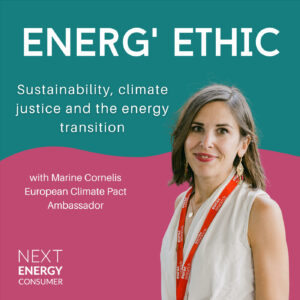
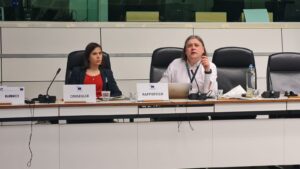
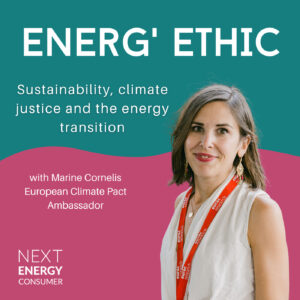

One Response